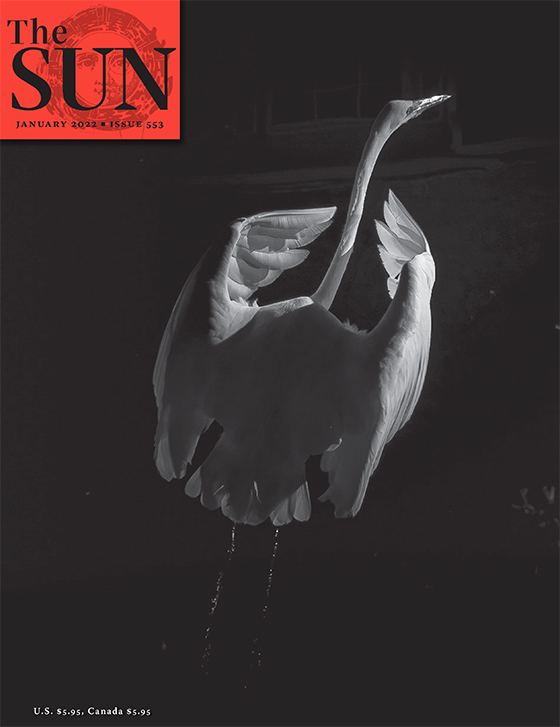Correspondence
Douglas Christie’s struggle to explain the delicate balance between engagement and dissociation in the contemplative life reminded me of a Talmudic commentary I once read:
“It was said of Reb Simcha Bunem that he carried two slips of paper, one in each pocket. On one he wrote, Bishvili nivra ha-olam: ‘For my sake the world was created.’ On the other he wrote, V’anokhi afar v’efer: ‘I am but dust and ashes.’ He would take out each slip of paper as necessary, as a reminder to himself.”
Whether we embrace the contemplative life or not, we can all benefit from a little boost when we feel worthless, and a little humility when we get too full of ourselves.
Victor Saffrin
Worcester, Massachusetts
The Sun is everything I want in a literary magazine: a mix of writing that is thoughtful but unpretentious and an approachable size and layout that is attractive without being intimidating.
After a long week your January 2022 issue made for wonderful Shabbat reading. I particularly enjoyed Leath Tonino’s interview with Douglas Christie [“The Desert Within”] on the contemplative tradition of the desert monks and nuns. Though I hail from a different religious tradition, I found the interview fascinating and powerful — perfect food for thought on my own mostly solitary day of rest.
Eleanor Bolker
Exeter, New Hampshire
Leath Tonino’s interview with Douglas Christie about the importance of silence reminded me of a conversation I had many years ago with my dad. He used to complain about his colleague Chuck: “I always have a list of a dozen things to do. If something falls through, I go on to the next. If Chuck has a free hour, he’ll just go and sit under a tree.” One day I asked my dad, “Did it ever occur to you that Chuck also has a list of a dozen things to do — and they all take place under that tree?” My dad looked at me like I was crazy at first, then stopped and said, “Maybe you have a point.”
Bob Rottenberg
Arcata, California
Leath Tonino’s interview with Douglas Christie [“The Desert Within,” January 2022] placed me right back in the Sinai Desert, where I took a five-day journey in 1977. One day I awoke at 3 AM and took a bus to the base of Mount Sinai. By the light of the full moon I hiked a long path, reaching the top just before sunrise. There I discovered what silence is. It is a desert: no trees or plants, no animals or insects, no wind. It was so quiet, I could hear my own heartbeat and my breathing. I became acutely aware of the sun, the mountain, and myself.
I’m grateful to Christie for awakening me once again to the power of silent stillness, which has become part of me.
Ilana Sophia
Port Townsend, Washington
I appreciated the focus on silence in your January 2022 issue, especially the Sunbeams passage by J. Krishnamurti. I have spent many hours trying to understand his conception of silence. My ex-wife used to roll her eyes when I would pull over on a car ride to sit at a spot that seemed particularly good for listening. Eventually this practice brought me to appreciate what Krishnamurti said: silence is right there with us, wherever we are.
Which is why I got a little impatient with the conversation at the other end of the issue. Leath Tonino’s interview with Douglas Christie [“The Desert Within”] contained so much erudition, so much knowledge about silence. I think we can do with less of Christie’s take on awareness as “an ideal not many of us can easily achieve” and more of Krishnamurti’s: “something that comes naturally when you are watching.”
David Baldwin
Cranston, Rhode Island
Throughout Leath Tonino’s interview with Douglas Christie, I couldn’t help thinking of the Quakers. As a practicing Quaker, I enjoy the prolonged deep silences of our worship meetings. I am fortunate to belong to a silent meeting, and, although wonderful spoken messages can arise, we sometimes sit for an hour in glorious, spiritually nourishing silence.
Sue Calhoun
Windham, Maine
More Letters





